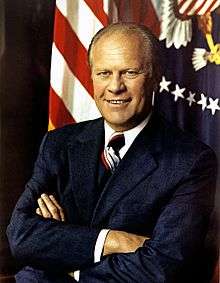United States vice presidential selection, 1973

In 1973, Republican Vice President Spiro Agnew was forced to resign following a controversy over his personal taxes. Under the terms of the 25th Amendment, a vice presidential vacancy is filled when the president nominates a candidate who is confirmed by both houses of Congress. Republican President Richard Nixon thus had the task of selecting a vice president who could receive the majority support of both houses of Congress. Nixon considered selecting former Texas Governor John Connally, New York Governor Nelson Rockefeller, and California Governor Ronald Reagan.[1] However, Nixon settled on House Minority Leader Gerald Ford of Michigan, who was popular among the members of Congress and who was good friends with Nixon.[1] Ford won the approval of both houses by huge margins, and was sworn in as the 40th Vice President of the United States on December 6, 1973.[1][2] In 1974, Ford ascended to the presidency after the Watergate scandal led to the resignation of President Nixon.
References
- 1 2 3 Mieczkowski, Yanek (22 April 2005). Gerald Ford and the Challenges of the 1970s. University Press of Kentucky. pp. 11–13. Retrieved 5 October 2015.
- ↑ Woodward, Bob (29 December 2006). "Ford, Nixon Sustained Friendship for Decades". Washington Post. Retrieved 5 October 2015.